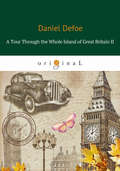
Даниэль Дефо
Atalantis Major
Marereskine, who had really a Voice in the Election, was there before him, and had busily embark'd Bellcampo, Lord of the Isles, and Brother to Greeniccio, to make Parties, and prepare Parties, sollicite Votes, get Proxies, and the like, about the Countries.
This Bellcampo, Lord of the Isles, was an insinuating self-interested Man, had little Fortune of his own, but resolved to raise himself which side soever got upmost: He run with every Stream, kept fair with every Side, spoke smoothly to all, meant Service to none, his dear Self excepted. By this means he got up from one Step to another to some good Employments, which his Interest and Diligence procured for him rather than his Sincerity; for he was first made a Peer on the Side he now acted against, and now a Judge acting against the Side made him a Peer, and the like.
These were the Instruments of the Fate of North Atalantis; Marereskine acted one Part, Greeniccio another: And here it is, as I said before, that the differing Parties, appeared so like our Whig and Tory, Episcopal and Presbyterian, that I cannot better describe them to you than by the same Names, only with this Difference, That all the Tories and Episcopal People in North Atalantis were Tartarians profestly, and boldly owned themselves for the Tartarian Emperor.
And now the two last mentioned Engines, having acted covertly for some time, which they had the better opportunity to do, because they had both appeared among the other Party, which now I'll call Whigs; before, the first of these carried it stiff and forward when he talked with the great Officers, or such Lords as had some Dependance upon the Court: He told them of what the Queen expected from them, what was their Duty to do, that they would find it their Interest to do so and so, that they might consider in Time what they had to do, and the like: When he talk'd with any of the Whig Lords, for there was a Squadron of them left, that had a great sway yet in the Country, then he would talk of him, and Party and Queen, as one Knot, in the plural Number, most haughtily, thus: We are resolved to do so and so, and we must have none but such or such.
The Lord of the Isles, at the same time acted his usual Flattery on both Sides, insinuating to the Whigs, that they were in No Danger; that there was not the least Design against them or their Liberties; that the Queen was resolved to change Hands, but would not change Principles; that their Church should not be touched, that their Priviledges should not in the least be infringed, and that they need not fear. One time, this Politick Peer, as he would be thought, was very handsomely met with, the Story is this, whether designedly or no it matters not. He was one Day in Company with some of the North Atalantis Ministers, for there just as here, they have one Church established in the North, and another in the South of the Island; He used all his Art in persuading the Ministers that they should be easie, that they should fear nothing, that there was no Design to give them the least Disturbance; that this was a Politick Turn, not a Religious, and that they should do well to be satisfied, and to satisfie their People that they were in no Danger, and should fear nothing. One of the Ministers, who had heard him very patiently, but saw easily through all his cunning; returns, Thus my Lord, shall I tell your Lordship a Story, and then he goes on with it. We had in former times, one John – who had the Honour to be his Majesty's Hangman in this City. This good Man had a most gentle easie Way of executing his Office; for when the poor People came into his Hands, and were to Die by his Operations, as many honest Men did in those cruel Days, (this by the way was home to his Lordship, for that this very John cut off his Lordships Grandfather's Head) all the while he was a fitting Things for the Execution of his Office, he would smile upon them, talk kindly to them, bid them not be afraid, Come, come, fear nothing, trust God, and the like: Then bringing them to the foot of the Ladder, he would still say, Be not afraid, come, come, fear nothing, step up one step, do not fear, trust in God, and so to another step and another; and just thus he carried 'em on, till at last, with the very Words in his Mouth, Fear nothing, he turn'd them off.
The honest Minister made no Application of the Story, much less took Notice, how his Lordship's own Grandfather not only fell by the same Hangman, but by the same Party that he then espoused: But he had too much Sense, and was too closely touch'd with the Story, not to make the Application himself; so he left the Ministers, giving no Reply at all to the Story.
This Story grew so popular, especially being printed by the Reviewer of that Country, that the Lord of the Isles could make nothing of his Design whenever he talk'd of the good Design of the Party; he was only laugh'd at, and bid remember his Grandfathers Hangman; so he became useless.
The Prince Greeniccio and the Earl of Marereskine then took upon them the Manegement of the whole Affair. They took publick Apartments in the Town, kept an affected State, called themselves the Queen's Managers, and had a Court as great as if they had been really so; they received the Visits of the Nobility with an Air of Majesty, and affected Gravity; and under this assumed Authority they took upon them to Closet the Noblemen when they came to pay their Respects to them; not to ask who they would give their Votes for, or to sollicit them to Vote for this or that, but in a Style haughty and insolent, especially to the Men of the greatest Character and Merit.
Greeniccio had several Ruffles with some of the Nobility, of which it may not be amiss to give some Account, because it may be for the Advantage of our Nobility to know, how Persons of like Quality in that Country can submit to be treated.
Bradalbino, a Nobleman of great Age and Authority in that Island, expected to be One of the Sixteen, and was told he was in the List; when he comes to Discourse with the Prince de Greeniccio, he tells him, Very plainly, That he thought it would be much for the Publick Good to put in Two or Three Lords, such as Leslynus, and one of the Family of Boiilio, being Men he thought could not properly be left out, and that if they were in, he would come into all the rest: The Prince, in a kind of Passion swore, By G – d, not of them; and but for naming them, laid aside Bradalbino himself.
Another Lord being an Officer in the Army, having the Court List proposed to him, answered, My Lord you kno' Leslynus is my General and Commander in Chief, and he could not as he commanded under him but Vote for his General, &c.Greeniccio in a fury returns, God d – n your General, what do you tell us of Commander in Chief? If that be all, we shall soon get you another Commander in Chief; you shall Vote for none such as he.
Another Lord expostulated with him a little to admit such and such with the Men he proposed; he answers, My Lord, I am no Hypocrite, I am above-board; this is the List we will have; the Q…n approves of it, and I will have no other; and swearing again, By-G – d, says he, 'Tis indifferent to me, keep out but the Men we are against; but I will have no Go…phin Men, no Ma…bro' Men, no Squadron Men, in short, no Whigs of any Denomination; as for the rest, it is indifferent, any but them. How, my Lord, says this Nobleman, What will you take Tartarians, (that is, as our Jacobites) rather than the honest Gentlemen that have been so true to the Atalantic Interest: I care not what they are, says the Prince, so they be none of these.
Among the Noblemen that he used with the most rudeness, was the Earl of Crawlindford: Whether he thought to Insult this faithful Nobleman, because he knew his Fortunes were low, and that he depended on the Court; or whether he took this Advantage to use him Ill on Account of an old Ruffle, in which he having challenged the Earl to Fight; and the Earl appearing ready to defend his Honour with his Sword; the Prince ashamed of the needless Quarrel, had declin'd it again, and came off but, so, so; choosing to risk his Honour rather than his Life; what was the Reason, Authors do not agree about; But the Prince used him most scandalously. The Earl prest him hard, and told him, How he had on all Occasions shewn himself faithful to the Queen, and to the Atalantic Interest, that he had gone into all such Measures as were for the Service of both, that he thought he had some Claim to be trusted in the Service of his Country.
The Prince told him plainly, He might set his Heart at rest, for he should not be one. He ask'd him, What Reason was assigned, what Objections were against him. The Prince, with much more Plainness than Prudence replies, They knew he was under Obligations to the President of the Treasure, and the great Commander of the Army; and he did not know but they might come to bring a Charge or Impeachment against them in the great Atalantic Council; and he would have no Body chosen but such as would give their Words they would come into such Measures. The Earl told him, If any thing could be offered to prove them Guilty, or any Crimes were made appear, he scorned to be so much obliged to any Man as not to dare to do Justice; and that he would readily join in an Impeachment, if there was Reason sufficient to Charge them; and to refuse him otherwise, implied, they wanted Crime and just Ground to form the Impeachment upon, and therefore must choose such a Set of Men as would Impeach innocent Men blindfold, to please a Party. The Prince told him, That the Resolution was to Impeach them, and he would have none chosen that would not agree to it. What, right or wrong, my Lord! says the Earl; to which the Prince, not suddenly replying, the Earl went on, Let what will come of it, and tho' I should lose all, nay, tho' I were to beg my Bread, I'll never submit to such base Terms, and so defied him. The Prince told him, It should be the worse for him; and there they parted.
There was a short Dispute between the Prince and the Earl of Stairdale; but the Earl had so much more Honesty than the Party, and so much more Sense and Wit than the Prince, that indeed he cared not much to talk to him, but left him to Mareskine. He was too hard for them both, and having baffled them in Discourse, he was no more to be Bullied by them, than he was to be Wheedled; he told 'em plainly, They were betraying their Country, selling and sacrificing the Priviledges of the Nobility, making themselves Tools to a Party, and giving themselves up in a base Manner to the Pleasure of a few Men, who, when they had got their Will would contemn them, would love the Folly, but P…s upon the Fools; and as to their List, he scorn'd to come into it, or into any of their menacing Measures. This put a short end to their Attempts upon him; and indeed, had the other Lords been advised by this gallant Gentleman, they had broke all their Schemes; but they were not all united in their Resolutions, or equally determined in their Measures.
Thus they went on, Mareskine mannag'd the most mildly; yet he told the Nobility of his Acquaintance: That the List was determined, that the Q…n expected they should Vote them all: that they would have no Mixtures: that her Majesty would have nothing to do with the Whig Lords, but there was other Work to do now than usual: Discoursing with some of the Lords, who were G – als in the Army, he told them plainly, They had resolved to Impeach the great Commander; and that it could not be expected, those who had Commands under him, and were Awed by him, should do Justice in that Case. They had often the Question put to them, What it was the great Commander, or the Keeper of the Treasure, had done, that they were to be Impeach'd for: But they could never be brought to offer the least tollerable Reason, except that the Prince Greeniccio let fall in his Passion sometimes, of which he had no manner of Government, That he had used him ill abroad.
Some, who had more nicely enquired into the Particulars of the ill Usage which was the Cause of this Resentment, have given the oddest contradicting Accounts of it that any History can Parallel: As first, That the great Commander had restrained the rashness of this young Hotspur General, who being but a Boy in Experience, compared to the Commander, was always for pushing into the Heart of Tartary with the Army; not considering, That to run up a Hundred Mile into the Country, and leave the Enemies Towns untaken, and their Armies in a Condition to Recruit, cut off their Convoys and Communication, and make their Subsistence impracticable, was the ready way to destroy them, as has been seen by a woful Example in Spain. But the General was wiser, and regarded more the Safety of the Army, and the Honour of his Mistress; and therefore, by the unanimous Approbation of all the allied Generals, (for it was not his own single Opinion) and according to the just Rules of War, went on gradually to take their fortified Towns, and ruin their Defences on the Frontiers, that at last, he might have a sure and easie Conquest of the rest: This was one Pretence. The second was just the Reverse of this: For at a great Battle with the Tartarians, the Commander having resolved to attack the Enemy in their advantageous Camp, and having drawn up in Battalia his whole Army, he gives the Post of Honour to the Prince, appointing him, with a select Body of the best Troops in the Army, to fall on upon the Right, and Charge the Enemy, while other Generals did the like, and with equal Hazard and more real Danger, on the Left. There was not a Gentleman in the Enemies Army but would have taken this as the greatest Testimony of his General's Esteem, and would have thought any Man in the Army his mortal Enemy that should have gone about to have deprived him of it. Nor was there any Man in the Attalantick Army, who did not take it as an Evidence of the great Opinion the Commander had of the Prince's Courage; and all the World talked of it as the greatest Honour could possibly be done the Prince.
Had not the Commander taken all needful Care to have him well back'd, had he not given him the best Troops in the Army to act under him, had he not plac'd a great Body of Horse to support him, had he not equally prest the Enemy in other Places, to prevent their doubling their Strength in that Part; had he done any Thing but what a Man of Honour would have thought himself obliged by, there might have been some Reason to Object: But to call giving a General a Post of Honour sacrificing him, because it was attended with Danger, is referr'd to the Determination of the Soldierly Part of Mankind. And as it would be laught at in Tartary, in France, and in Britain, where such Things are very seldom heard of; so I can assure the Reader, it was sufficiently laugh'd at in Attalantis Major, and the Prince of Greeniccio is become most intollerably ridiculous by the taking Notice of it.







